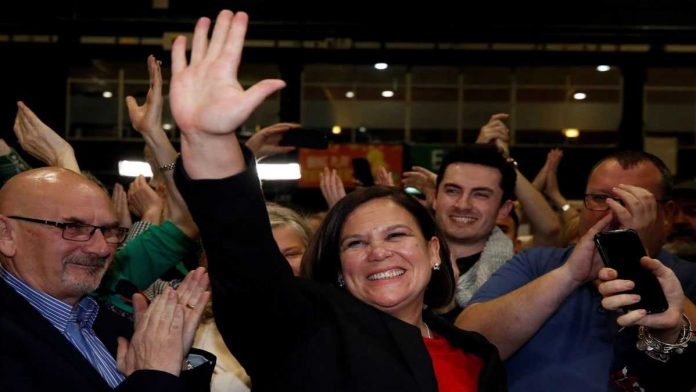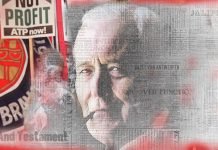
Left-wing Irish nationalist party Sinn Fein has demanded to be part of the next Irish government after an election that leader Mary Lou McDonald described as a ballot box “revolution”.
A seismic election in Ireland has reshaped the traditional electoral landscape, with the left-wing nationalist party Sinn Féin surging into first place ahead of the traditionally dominant Fine Gael and Fianna Fáil for the first time in the history of the republic.
McDonald vowed to work with like-minded parties to form Ireland’s next ruling coalition after a sensational performance in the country’s general election that challenges the 90-year power duopoly of Fine Gael and Fianna Fail.
“The two-party system in this country is now broken, it has been sent to the history books,” said Sinn Féin leader Mary Lou McDonald as she arrived at a Dublin count center.
Counting is still underway and with the race so close, the ultimate seat breakdown may not be known for days. But with almost all first-preference votes tallied, Sinn Féin had won the popular vote with 24.1 percent ahead of Fianna Fáil on 22.2 percent and Fine Gael on 22.1 percent. No party will have enough seats to easily form a government, but the fallout is already becoming apparent.
Sinn Féin looks poised to win at least 10 extra seats in the 33rd Dáil as it benefits from a dramatic surge in support from voters in the general election.
While it remains unclear whether it will ultimately be part of any future coalition, the support gained by Mary Lou McDonald’s party has sent shockwaves across the Irish political landscape.
As counting continues in the 39 constituencies, Ms McDonald said she has been in touch with the Greens, Social Democrats and People Before Profit to arrange government formation talks.
Speaking at the RDS on Sunday, she said she wants to explore whether such a new government would be possible.
“I also have consistently said that I will talk to and listen to everybody, I think that is what grown-ups do and that is what democracy demands.”
Ms McDonald, who was re-elected on Sunday evening, said it was “not sustainable” for either Fine Gael leader Leo Varadkar or Fianna Fáil leader Micheál Martin “to say they will not speak to us, representatives of such a sizeable section of the Irish electorate”.
She said she was not shocked by the countrywide surge in support and acknowledged that the party should have fielded more candidates.
“It is a big statement of change. This is no longer a two-party system. People want a different type of government.”
‘Not compatible’
On Sunday Taoiseach [prime minister] Leo Varadkar, who was elected on the fifth count in Dublin West, said he will not be speaking to Sinn Féin with a view to forming a coalition after the election. Speaking at his count centre in Dublin, he said Fine Gael was “not compatible with Sinn Féin”.

Why is Leo Varadkar doing badly?
Though Fine Gael spearheaded the landmark liberal reforms of legalising gay marriage in 2015 and abortion in 2018, it is primarily defined by its pro-business, budget-balancing economic policies.
“While the rest of the world may see an impressive, gay, Irish-Indian Taoiseach [prime minister], in Ireland people … primarily see him as the leader of Fine Gael who has really taken a small-c conservative line,” said Maura Adshead, a political scientist at the University of Limerick.
Discussions have already started in party circles of a challenge to Varadkar’s leadership, with the name of Foreign Minister Simon Coveney — the popular runner-up in the 2017 leadership election — doing the rounds.
The poor result from Fine Gael in this election, and even Varadkar’s own failure to top the poll in his own consituency, is largely down to government policy on things like housing and health.
People feel not enough has been done in the past nine years under Fine Gael and are voting for a change. Polls showed Varadkar’s successes with Brexit and the economy mattered little when people were casting their votes.
Varadkar may have been feted on the European stage, and pulled off a diplomatic feat by protecting Ireland’s interests in Brexit, but – as is often the case with these things – his own electorate at home aren’t rewarding him for it.
Brexit not relevant
Varadkar hoped to benefit from widespread public approval of his defence of Ireland’s interests in the Brexit negotiations, and put the issue front and center in the campaign.
But it fell flat with voters: Only 1 percent said it was important to them in deciding how to vote.
The most important issues for voters were health and housing.
“Although Brexit was negotiated by his team, a large part of that negotiation is by the Irish state, the civil servants,” said political scientist Adshead.
“Given the fact that there was cross-party support, it’s quite hard for him to take personal credit for what was a national consensus.”
The most important issues for voters were health and housing, reflecting unhappiness with strained public services that have struggled to keep up with a growing population and an economy developing at the fastest rate in the European Union.
Nativist politics flop
Most of Ireland’s far right candidates are polling below 1% in their individual constituencies. This despite Ireland having one of the highest rates of inward migration in Europe. https://t.co/19rnzR0NL8
— John O’Brennan (@JohnOBrennan2) February 9, 2020
There was a well-organised attempt during the campaign to establish anti-immigration, nativist politics in Ireland, which has so far not experienced the radical right surge seen around the world.
However, just 1 percent of voters felt immigration was an important factor in their vote, according to the exit poll.
Instead, the biggest gains in support were enjoyed by Sinn Féin and the Green Party, both of which shun anti-immigration politics and speak in favor of the rights of refugees.
Support Independent Journalism Today
Our unwavering dedication is to provide you with unbiased news, diverse perspectives, and insightful opinions. We're on a mission to ensure that those in positions of power are held accountable for their actions, but we can't do it alone. Labour Heartlands is primarily funded by me, Paul Knaggs, and by the generous contributions of readers like you. Your donations keep us going and help us uphold the principles of independent journalism. Join us in our quest for truth, transparency, and accountability – donate today and be a part of our mission!
Like everyone else, we're facing challenges, and we need your help to stay online and continue providing crucial journalism. Every contribution, no matter how small, goes a long way in helping us thrive. By becoming one of our donors, you become a vital part of our mission to uncover the truth and uphold the values of democracy.
While we maintain our independence from political affiliations, we stand united against corruption, injustice, and the erosion of free speech, truth, and democracy. We believe in the power of accurate information in a democracy, and we consider facts non-negotiable.
Your support, no matter the amount, can make a significant impact. Together, we can make a difference and continue our journey toward a more informed and just society.
Thank you for supporting Labour Heartlands











